语法知识—状语从句的分类汇编及解析
状语从句的种类与用法详解

状语从句的种类与用法详解状语从句是英语语法中的重要部分,它在句子中充当状语,用于修饰、限定主句的动作、状态或其他方面。
状语从句有多种种类和用法,下面将对其进行详细解析。
1. 时间状语从句时间状语从句用于表示主句中的动作发生的时间,具体用法如下:- 当主句谓语动词表示延续性动作时,使用while引导的时间状语从句。
例如:While I was studying for the exam, my phone rang.(当我正在备考时,我的手机响了。
)- 当主句谓语动词表示瞬时性动作时,使用when或as引导的时间状语从句。
例如:When I arrived at the station, the train had already left.(当我到达车站时,火车已经开走了。
)2. 地点状语从句地点状语从句用于表示主句中的动作发生的地点,具体用法如下:- 使用where引导的地点状语从句。
例如:I will meet her where we had our first date.(我会在我们第一次约会的地方见她。
)3. 原因状语从句原因状语从句用于表示主句中的动作发生的原因,具体用法如下:- 使用because或since引导的原因状语从句。
例如:He couldn't come to the party because he had to work overtime.(他不能来参加聚会,因为他得加班。
)- 使用as引导的原因状语从句,强调两个动作同时发生。
例如:As the sun set, the sky turned orange.(太阳下山时,天空变成橙色。
)4. 条件状语从句条件状语从句用于表示主句中的动作发生的条件,具体用法如下:- 使用if或unless引导的条件状语从句。
例如:If it rains tomorrow, we will stay indoors.(如果明天下雨,我们将呆在室内。
状语从句知识点详解(初中英语专项复习)14

状语从句知识点详解(初中英语专项复习)状语从句的概念: 用一个句子作状语来修饰动词和形容词,以表明动作发生或状态存在的时间、地点、原因等,这个句子就叫做状语从句。
状语从句的分类:状语从句共分为九大类,包括:时间、地点、原因、条件、让步、目的、结果、方式、比较状语从句。
下面分别讲解:一、时间状语从句概念:用来表示时间的状语从句,由when, while, as, till, until,before, after, since等引导。
由于时间状语从句的引导词所表示的意思并非一致,不同引导词表达不同的时间,它们在句子中对应的时态、语态等也有所不同。
例如:when /while引导的时间状语从句when引导的从句的谓语动词通常是瞬间动词,也可以是延续性动词。
从句动作可与主语动作通常先后发生也可同时发生。
I was writing when my sister came back.( come是瞬间动词,只能用when引导,不能用while)He often wrote me when/while he studied in Shanghai International Studies University.( study 是延续性动词,while可代替when)While my mother was cooking , I was playing chess with dad. (cook是延续性的动词,cook和play同时发生)I like playing chess while my sister likes reading stories.我喜欢下棋,而我姐姐喜欢看小说。
(while表示对比)when和while的区别还有:while引导的时间状语从句多用于进行时态,而when引导的时间状语从句多用于一般时态。
While we were playing games, our headmaster called me .我们正在做游戏的时候,校长叫我了。
状语从句的种类与用法总结

状语从句的种类与用法总结状语从句是在复合句中,作为主句中的一个成分,用来修饰或限制主句的动词、形容词、副词等成分。
状语从句分为时间状语从句、原因状语从句、条件状语从句、目的状语从句、结果状语从句、让步状语从句等几种类型。
下面将对这些状语从句的特点和用法进行总结。
1. 时间状语从句时间状语从句用来表示动作发生的时间,可以分为过去、现在和将来几个方面。
常见的引导词有when, while, as, before, after, since, until 等。
例如:- I will go to bed after I finish my homework.(当我完成作业之后,我会去睡觉。
)- She always looks happy when she sees her friends.(当她见到她的朋友时,她总是看起来很开心。
)2. 原因状语从句原因状语从句用来表示动作的原因,常见的引导词有because, since, as等。
例如:- He didn't attend the meeting because he was sick.(因为他生病了,所以他没有参加会议。
)- Since it is raining outside, we should bring an umbrella.(因为外面在下雨,所以我们应该带把伞。
)3. 条件状语从句条件状语从句用来表示某种条件下会发生的情况,常见的引导词有if, unless, provided that等。
例如:- If it rains tomorrow, we will stay at home.(如果明天下雨,我们会呆在家里。
)- You can go out unless it is too hot.(除非天气太热,你可以出去。
)4. 目的状语从句目的状语从句用来表示主句的动作是为了实现从句中的目的,常见的引导词有so that, in order that等。
状语从句语法点

状语从句一、状语从句的定义、功能、分类定义:在复合句中作状语的从句。
功能:状语从句在主从复合句中修饰主句中的动词,形容词或副词,或整个主句。
若去掉状语,句子从语义和语法上都是一个完整的句子,状语从句是一个句子作状语,同理,去掉状语从句的主句从语义和语法上都是一个完整的句子。
分类:按意义可分为时间、地点、原因、目的、结果、条件、方式、比较、让步等状语从句。
位置:从句的位置放在句首,也可放在句末。
放在句首时,从句后面常用一个逗号,放在句末时,从句前一般不用逗号。
二、九种常见状语从句用法(一)时间状语从句引导时间状语从句的从属连词1)基本类:before、after、when、while、as、since、till、until、once、as soon as, etc.2)名词类:the moment ,the minute, the second, the instant, etc. (一…就…); every time, each time, next time, the last time, the first time, by the time, the day, the year, the morning, etc.3)副词类:immediately, directly, instantly, etc. (一...就...)4)句型类:no sooner…than…, hardly/scarcely…when…, etc. (一…就…)例句:Tell him I need to see him the minute he arrives. 他一到就告诉他我要见他。
The children ran away from the orchard(果园) the moment they saw the guard.The moment he saw me, he ran away. 他一看见我,就跑了。
状语从句知识点大总结

状语从句知识点大总结一、状语从句的定义状语从句是一个句子,它在句子中作状语,修饰主句中的动词、形容词、副词等,用以表示时间、条件、原因、目的、结果、比较等不同的状态。
状语从句通常由连词引导,常用的连词包括when, while, as, since, before, after, until, if, unless, although, though, as if, as though, so that, in order that, in case, even if等。
二、状语从句的分类1. 时间状语从句时间状语从句表示动作发生的时间,常用的引导词有when, while, as, before, after, since, until, as soon as等。
例如:- When I was young, I used to go swimming every day.- I will call you as soon as I arrive.2. 条件状语从句条件状语从句表示条件,常用的引导词有if, unless, provided that, as long as等。
例如:- If it rains tomorrow, we will stay at home.- I will go out unless it is raining.3. 原因状语从句原因状语从句表示原因,常用的引导词有because, since, as, for等。
例如:- Since it is raining, we can't go out.- I won't go to the party because I don't feel well.4. 目的状语从句目的状语从句表示目的,常用的引导词有so that, in order that, lest等。
例如:- I study hard so that I can get a good job.- We left early in order that we might avoid the traffic.5. 结果状语从句结果状语从句表示结果,常用的引导词有so...that, such...that等。
初中英语语法之状语从句类型及考点讲义

初中英语语法之状语从句类型及考点讲义状语从句概念解析状语从句指句子用作状语时,起副词作用的句子,可以修饰谓语、非谓语动词、定语、状语或整个句子,可分为时间、地点、原因、条件、目的、结果、让步、方式和比较等从句,是英语复合句学习的一个重点,在各类考试中都会经常出现,这次就来给大家讲解一下什么是状语从句。
1. 时间状语从句:常用引导词:when, as, while, as soon as, before, after, since , till, until特殊引导词:the minute, the moment, the second, every time, the day,the instant, immediately , directly, no sooner … than, hardly …when, scarcely … when instantlyI ran into the classroom as soon as the bell rang.2. 地点状语从句:常用引导词:where特殊引导词:wherever, anywhere, everywhereWherever the sea is , you will find seamen.3. 原因状语从句:常用引导词:because=in that, since=now that, as, for特殊引导词:seeing that, now that, in that, considering that, given thatI 'm late because I didn't caught the bus.4. 目的状语从句:常用引导词:so that, in order that特殊引导词: for fear that(唯恐/生怕),in the hope that, for the purpose that, to the end thatYou should book the hotel in advance so that the travel will be more easy.5.结果状语从句:常用引导词:so … that, such … that特殊引导词:such that, to the degree that, to the extent that, to such a degree thatHe is so young that he can't have meal by himself.6. 条件状语从句:常用引导词:if, unless,特殊引导词:as/so long as(只要), only if, providing/provided that(倘若), supposing that(倘若), in case that(以防), on condition thatYou can go to London as long as you have passport.7.让步状语从句:常用引导词:though, although, even if, even though特殊引导词: as(用在让步状语从句中必须要倒装),while,no matter …, in spite of the fact that, whatever, whoever, wherever, whenever, however, whichever, as if=as thoughThough we are old, we still can do these by ourselves.8. 比较状语从句:常用引导词:as(同级比较), than(不同程度的比较)特殊引导词:the more …the more …; just as …,so…,no … more than; not A so much as BShe is as pretty as her mother.9. 方式状语从句:常用引导词:as, as if, how特殊引导词:the wayHe didn't so it the way his brother did.辨析:while,when,as三者引导的时间状语从句时间状语从句算是状语从句中最简单的一类,也是我们日常生活交流中最常用的一类,虽然难度不大,但引导词也不少,仍然有不少同学会弄混那几个常见引导词的用法,这次就为大家带来as,when,while这几个词的辨析方法,一起看看吧。
2024年人教版中考英语语法课件:状语从句知识点归纳

Wherever my sister visits, she will send me a postcard. =No matter where my sister visits, she will send me a postcard.
as
当.....时, 一边...一边...
强调主从句动作同时进行
I saw the sun as I opened the window.
1、时间状语从句
2、until/ till 引导词: ① until和till意为“直到”,很多时候可以互换,但是用于句首的时候,常用until。 Until you get back, I will sit here.
3、让步状语从句
(表示主句中的某一动作或状态与从句中的某一动作或状态在意义上有部分矛盾。) 1、although/though 引导词: although/though意为“尽管,虽然”,不与but连用,但可用yet/ still. Although/ though he works hard, yet he makes slow porgress.
③ She is such a beautiful girl that everybody loves her.
4、结果状语从句
(结果状语从句表示主句中某一动ห้องสมุดไป่ตู้或状态所产生的结果)
4、so…that… 与 such… that… 互换: 两者都意为“如此......以致于”
so+形容词+a/an+单数可数名词+that从句 人称代=s词uc是h为+a了/a避n+免我形重们容复、词,他+用们单来/数代她可替们数前/名面它词提们到”+等t过h代a的t词从人。句、人事称物代等词名有词人的称词、,单主复要数包以括及“你格、的我变、化他。,她/它、你们、
状语从句的分类和用法

状语从句的分类和用法状语从句是指在复合句中充当状语的从句,用来修饰主句中的动作或描述情况。
状语从句的使用能够丰富句子结构,使语言表达更加准确和生动。
本文将介绍状语从句的分类和用法。
一、状语从句的分类根据状语从句与主句之间的关系不同,状语从句可以分为时间状语从句、条件状语从句、原因状语从句、结果状语从句和让步状语从句等几种。
1. 时间状语从句时间状语从句用来表示动作发生的时间或频率,常见的引导词有when(当...时候)、while(当...的时候)、before(在...之前)、after (在...之后)等等。
例如:He called me when he arrived at the station.(他到达车站的时候给我打电话。
)2. 条件状语从句条件状语从句用来表示发生某种条件时的结果,常见的引导词有if (如果)、unless(除非)、in case(以防)、as long as(只要)等等。
例如:If it rains tomorrow, we will stay at home.(如果明天下雨,我们会呆在家里。
)3. 原因状语从句原因状语从句用来表示某个行为或情况的原因,常见的引导词有because(因为)、since(因为)、as(由于)、for(因为)等等。
例如:He couldn't come to the party because he was sick.(他因为生病不能来参加派对。
)4. 结果状语从句结果状语从句用来表示某个行为或情况的结果,常见的引导词有so...that(如此...以至于)、such...that(如此...以至于)、so that(以便)、such that(以便)等等。
例如:She studied hard so that she could pass the exam.(她努力学习以便能够通过考试。
)5. 让步状语从句让步状语从句用来表示与主句相对立的情况,常见的引导词有although(虽然)、though(虽然)、even though(即使)、while(尽管)等等。
英语语法:状语从句八大类型的区分以及知识点讲解
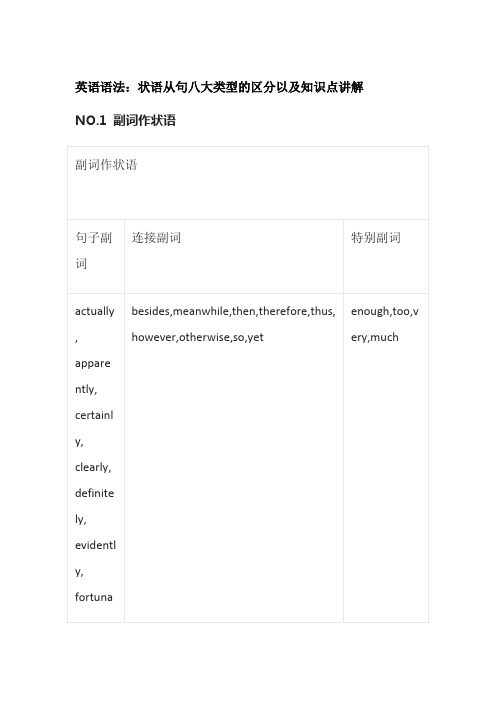
英语语法:状语从句八大类型的区分以及知识点讲解NO.1 副词作状语(1)句子副词:句子副词用于修饰句子(而不是修饰某个单个的词),反映说话人的观点和看法。
如actually, apparently, certainly, clearly,definitely, evidently, fortunately, frankly, honestly, luckily, obviously, perhaps, possibly, probably, surely, undoubtedly, unexpectedly 等。
作用以及位置:句子副词通常位于句首(或分句句首)。
Eg:Obviously he can't tell the difference between them. 显然他无法区别两者的不同。
I arrived late but luckily the meeting had been delayed. 我迟到了,幸而会议推迟了。
但有些句子副词也可以出现句中。
eg:He smiled nastily. He evidently knew something I didn't. 他发出狞笑,他显然知道一些我所不知道的事。
有的句子也可用作其他种类的副词,不过这往往会导致位置和语义的变化:Clearly he didn't say so. 显然他没有这样说。
(句子副词)He didn't say so clearly. 他说得没有那么清楚。
(方式副词)(2)起连词作用的副词连接副词就是连接词,如besides,meanwhile,then, therefore, thus, However,Otherwise, so, yet 等。
作用以及位置:常放在两个句子中间,前面为逗号,后面放连接词,从句之前。
注意:so 也可放在形容词之前做修饰,yet 可放句尾或从句之前。
状语从句用法总结计划完整

一、时间状语从句时间状语从句用来表示时间关系,常由连词“当……时候”、“随着”、“一旦”、“随时”、“直到”、“自从”等引导。
例如:1.当我在家里的时候,我妈妈总是在旁边看着我。
2.随着天气的转暖,我们就可以去郊游了。
3.一旦你有了问题,就可以找我帮忙。
4.随时都可以来找我,我随时都在。
5.直到你完成这个任务,我才会离开。
6.自从我来到这个城市,我就没有回过家。
二、地点状语从句地点状语从句用来表示地点关系,常由连词“在……地方”、“位于”、“从……起”、“直至”等引导。
例如:1.在这个超市里,你可以找到各种各样的商品。
2.位于市中心的位置,使得这个商场非常繁华。
3.从这家公司起,我们的合作就一直非常好。
4.直至你找到工作,你就可以安心了。
三、原因状语从句原因状语从句用来表示原因关系,常由连词“因为”、“由于”、“鉴于”等引导。
例如:1.因为我今天不舒服,所以我不想去上课。
2.由于天气的原因,我们取消了郊游计划。
3.鉴于你的表现,老师给了你很高的评价。
四、条件状语从句条件状语从句用来表示条件关系,常由连词“如果”、“只要”、“除非”、“只要……就”等引导。
例如:1.如果明天不下雨,我们就去郊游。
2.只要你能努力,你一定能成功。
3.除非你道歉,否则我不会原谅你。
4.只要你想明白,你就会知道我为什么这样做。
五、目的状语从句目的状语从句用来表示目的关系,常由连词“为了”、“以便”、“好”等引导。
例如:1.为了能更好地学习,他每天都很努力。
2.以便你能理解,我解释得很详细。
3.好让你明白,我特意给你举个例子。
六、结果状语从句结果状语从句用来表示结果关系,常由连词“所以”、“因此”、“结果”、“从而”等引导。
例如:1.所以他没能来,因为他生病了。
2.因此我们决定,明天再去郊游。
3.结果这个方法很有效,我们很快就完成了任务。
4.从而使我们的工作更加顺利。
一、时间状语从句时间状语从句用来表示时间关系,常由连词“当……时候”、“随着”、“一旦”、“随时”、“直到”、“自从”等引导。
(完整版)高中英语语法-状语从句归纳总结
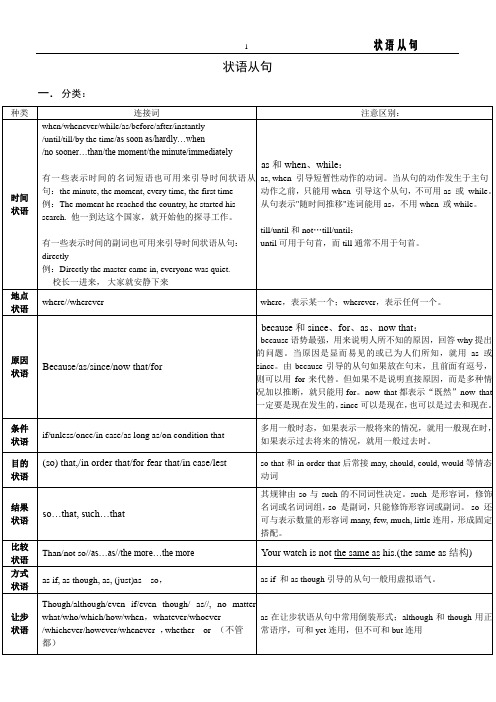
状语从句一.分类:when (当……的时候) while (在……期间) as (当……的时候, 一边……一边……)before (在……之前) since (自从……以来) till/until (直到) hardly…when… (刚……就) as soon as (一……就……)after (在……之后) not…till/until(直到……才)no sooner…than…(刚……就) 地点状语从句:where (在那里) wherever(无论哪里)原因状语从句:because (因为) since (因为,既然) as (由于) for (为了) now that(既然)目的状语从句:(so)that=in order that(以便)so as(not)to (以便[不])in case(以免)lest(以免)结果状语从句:so+adj./adv.+that(如此……以致)so that(结果……)such+n.+that(如果……以致)that(所以,因此)让步状语从句:though/although不可同but连用。
though/although (虽然)however (可是)even though/if(即使)no matter+what/which/where/who/when =whatever/whichever/wherever/whoever/whenever(不论什么/哪一个/哪里/谁/何时)比较状语从句:as (正如)as…as(和……一样)not as/so … as (不如……)than(比……更)the+比较级…+the+比较级(越……越……)条件状语从句:if(假设)unless(如果不)so long as(只要)on condition that (如果)方式状语从句:as(像……那样地)just as(正像)as if(好像)as though(好像)二.各种状语从句的简化方法:1作状语。
状语从句详解

状语从句详解状语从句是复句中的一种从句,用来修饰动词、形容词、副词或整个句子。
它起到进一步说明、补充或限制主句的作用。
本文将详细解析状语从句的定义、分类、用法及注意事项。
一、状语从句的定义状语从句是一个从属分句,由连词引导,在主从句之间建立一种从属关系。
它通常修饰动词、形容词、副词或整个句子,用来表示时间、条件、原因、目的、方式、程度、比较等等。
通过引导词的不同,状语从句可以分为多种类型。
二、状语从句的分类1. 时间状语从句时间状语从句用来表示动作发生的时间,在主句中起到修饰的作用。
时间状语从句常用的引导词有:when(当)、while(当...时)、before (在...之前)、after(在...之后)、as(当...的时候)等等。
例如:- I will call you when I arrive home.(我到家后会给你打电话。
)- They went to bed after they finished their homework.(他们做完作业后就上床睡觉了。
)2. 条件状语从句条件状语从句用来表示主句发生的条件,在主句中起到修饰的作用。
条件状语从句常用的引导词有:if(如果)、unless(除非)、provided that(只要)、as long as(只要)等等。
例如:- If it rains, we will stay at home.(如果下雨,我们将待在家里。
)- You can go out unless it is too cold.(除非天气太冷,你可以出去。
)3. 原因状语从句原因状语从句用来表示主句发生的原因,在主句中起到修饰的作用。
原因状语从句常用的引导词有:because(因为)、since(因为)、as (因为)、for(因为)等等。
例如:- She didn't come to the party because she was sick.(她没有来参加聚会,因为她生病了。
状语从句知识点总结详细

状语从句知识点总结详细状语从句是英语语法中一个重要的概念,它指的是在句子中起修饰或说明作用的从句,通常用来描述主句中的动作或状态的时间、地点、方式、原因、条件等。
以下是关于状语从句的详细知识点总结:一、时间状语从句:时间状语从句通常由when、while、before、after等引导词引导,表示主句动作发生的时间。
例如:When the rain stopped,we went out for a walk.(当雨停了,我们出去散步。
)While I was studying,my roommate was watching TV.(当我在学习时,我的室友在看电视。
)二、地点状语从句:地点状语从句通常由where、wherever等引导词引导,表示主句动作发生的地点。
例如:Go where you like.(去你喜欢的地方。
)Wherever you go,I will follow you.(无论你去哪里,我都会跟着你。
)三、方式状语从句:方式状语从句通常由as、as if、as though等引导词引导,表示主句动作进行的方式或状态。
例如:She acts as if she were the boss.(她表现得好像她是老板。
)He talks as though he knew everything.(他说话好像他知道一切。
)四、原因状语从句:原因状语从句通常由because、since、as等引导词引导,表示主句动作发生的原因。
例如:I didn't go to the party because I was tired.(我没去参加派对,因为我累了。
)Since you are here,you can help us.(既然你在这里,你可以帮助我们。
)五、条件状语从句:条件状语从句通常由if、unless等引导词引导,表示主句动作发生的条件。
例如:If you study hard,you will pass the exam.(如果你努力学习,你会通过考试。
高中九大状语从句详细解析+例句

状语从句Adverbial ClauseI 定义和分类一、定义在复合句中充当状语的从句叫状语从句。
状语从句通常由从属连词或起连词作用的词组引导。
试比较下列两句句子:1.I will return the book to him tomorrow. 我明天会把书还给他。
2.I will return the book to him when I meet him. 我见到他时会把书还给他。
分析在句1中,副词tomorrow作为时间状语在修饰动词return。
在句2中出现了两个谓语动词,分别是return和meet,表示有两句句子存在。
句2中的when I meet him取代了句1中tomorrow的位置。
when作为状语从句的引导词(即从属连词)连接起了主句I will return the book和从句I meet him两部分。
在分析主从句时,可以通过确定谓语动词和连词来将长句变为短句,从而便于理解句子的意思。
二、分类状语从句根据它表达的意思不同,可以分为以下基本的九类:1.时间状语从句,例如:When he arrived home last night, it was just nine o'clock. 昨晚他到家时恰好九点。
2.地点状语从句,例如:I put the book back where it had been. 我把书放回了原处。
3.原因状语从句,例如:It is inexpensive to produce because it is made from corn.由于是玉米做成的,它的生产成本不高。
4.目的状语从句,例如:They took a subway in order that they might not be held up in the traffic.为了不被堵在路上,他们搭乘了地铁。
5.结果状语从句,例如:The village is so small that it cannot be shown in the map.这个村庄太小了以致于在地图上都找不到。
状语从句知识点
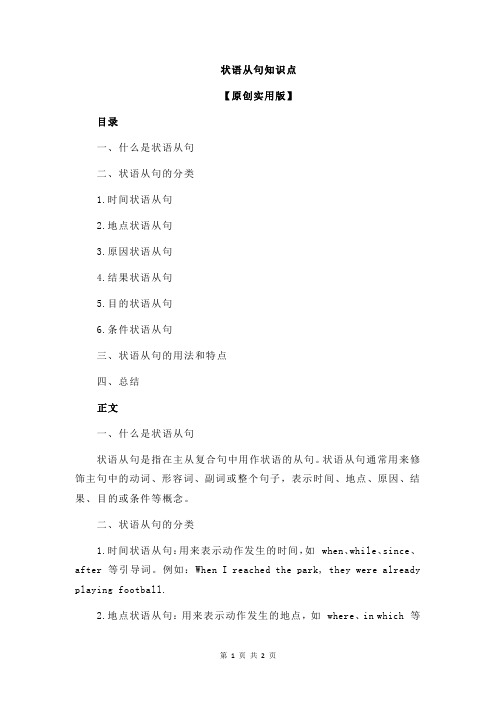
状语从句知识点【原创实用版】目录一、什么是状语从句二、状语从句的分类1.时间状语从句2.地点状语从句3.原因状语从句4.结果状语从句5.目的状语从句6.条件状语从句三、状语从句的用法和特点四、总结正文一、什么是状语从句状语从句是指在主从复合句中用作状语的从句。
状语从句通常用来修饰主句中的动词、形容词、副词或整个句子,表示时间、地点、原因、结果、目的或条件等概念。
二、状语从句的分类1.时间状语从句:用来表示动作发生的时间,如 when、while、since、after 等引导词。
例如:When I reached the park, they were already playing football.2.地点状语从句:用来表示动作发生的地点,如 where、in which 等引导词。
例如:This is the place where we met last time.3.原因状语从句:用来表示动作发生的原因,如 because、since、as 等引导词。
例如:I am late because of the traffic.4.结果状语从句:用来表示动作产生的结果,如 so、such、that 等引导词。
例如:She is so beautiful that everyone stares at her.5.目的状语从句:用来表示动作的目的,如 to、in order to、so as to 等引导词。
例如:I studied hard to pass the exam.6.条件状语从句:用来表示动作发生的条件,如 if、unless、provided that 等引导词。
例如:I will lend you the book if you return it next week.三、状语从句的用法和特点状语从句通常由连词、副词或代词引导,其主语和谓语与主句保持一致。
状语从句的位置灵活,可以根据需要放在主句之前、之后或中间。
(完整版)状语从句超详细讲解
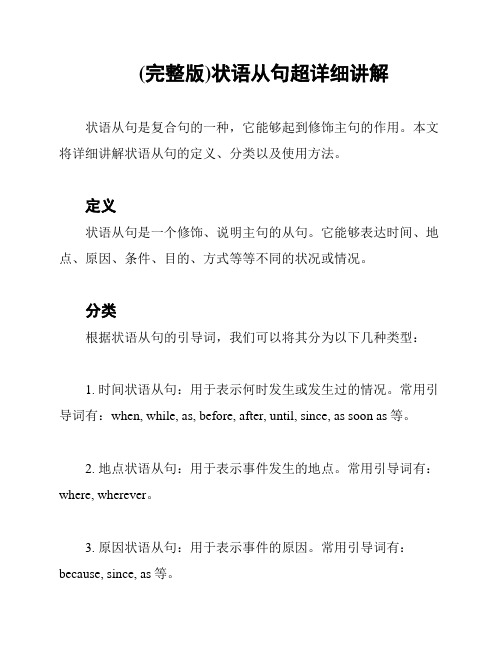
(完整版)状语从句超详细讲解状语从句是复合句的一种,它能够起到修饰主句的作用。
本文将详细讲解状语从句的定义、分类以及使用方法。
定义状语从句是一个修饰、说明主句的从句。
它能够表达时间、地点、原因、条件、目的、方式等等不同的状况或情况。
分类根据状语从句的引导词,我们可以将其分为以下几种类型:1. 时间状语从句:用于表示何时发生或发生过的情况。
常用引导词有:when, while, as, before, after, until, since, as soon as等。
2. 地点状语从句:用于表示事件发生的地点。
常用引导词有:where, wherever。
3. 原因状语从句:用于表示事件的原因。
常用引导词有:because, since, as等。
4. 条件状语从句:用于表示某种条件下发生的情况。
常用引导词有:if, unless, provided that, as long as等。
5. 目的状语从句:用于表示主句中的动作或状态的目的。
常用引导词有:so that, in order that。
6. 方式状语从句:用于表示主句中的动作或状态发生的方式。
常用引导词有:as, as if, as though。
使用方法在使用状语从句时,需要注意以下几点:1. 引导词的选择要准确。
不同类型的状语从句需要选择相应的引导词,以确保表达的准确性。
2. 状语从句的位置可以灵活调整。
可以将状语从句放在主句之前、之后或中间,但要注意语序的调整,以保证句子的通顺。
3. 使用适当的标点符号。
根据句子结构和语义需要,可以在状语从句和主句之间使用逗号、连词等标点符号。
4. 注意主从句的时态和语态一致性。
主句和状语从句之间的动作发生时间要一致,并保持相同的语态。
总结状语从句是一种修饰主句的从句,能够表达时间、地点、原因、条件、目的、方式等不同状况。
根据引导词的不同,状语从句可以分为时间状语从句、地点状语从句、原因状语从句、条件状语从句、目的状语从句和方式状语从句。
英语语法状语从句的归纳总结

英语语法状语从句的归纳总结Ability is not the only criterion, but character is the criterion.英语语法状语从句的归纳总结在复合句中修饰主句或主句中的某一成分的从句叫状语从句..状语从句通常由从属连词或起连词作用的词组引导;有时甚至不需要连词直接和主句连接起来..状语从句根据它表达的意思不同;可分为时间、地点、原因、目的、结果、条件、方式、比较、让步等九类..一、时间状语从句时间状语从句是表示时间关系的从句..可以引导时间状语从句的连词很多;根据意义和主从句之间的时间关系;通常可分为以下几种情况:A.when; while; as; wheneverwhen; while; as表示主句谓语作和从句的谓语动作同时发生或几乎同时发生..1.when①when表示点时间时;从句中用短暂性动词;表示段时间时;用持续性动词..When I got home; my family were already having dinner.我到家的时候;全家已在吃晚饭..when表示点时间When they were still talking and laughing; the teacher came in. 当他们还在说笑的时候;老师进来了..when表示段时间He waved a hello when he saw her.当他看见她的时候;就挥手打了个招呼..when表示点时间When you think you know nothing; you begin to know something.当你认为自己一无所知的时候;就开始知道一些事情了..when表示段时间注意:当when意思是正当……时候and at that moment时;when只能跟在前一分句之后..He was about to go to bed when the doorbel rang.他正要上床;忽然门铃响了..They were watching the World Cup when suddenly the lights went out.他们正看着世界杯比赛;突然灯灭了..They had just arrived home when it began to rain.他们刚到家;天就开始下雨了..②有时when表示虽然;尽管的含义;相当于although或since..He walks when he might take a taxi.尽管可以打的;但他还是步行..How can you hope for mercy yourself when you show none既然你不宽恕别人;你自己又怎能希望得到别人的宽恕呢2.while①while通常表示一段时间;从句中宜用持续性动词作谓语..Strike while the iron is hot.趁热打铁..She fell asleep while she was reading the newspaper.她在看报的时候睡着了..②while有时可以作并列连词;表示对比;可译成……而……..I am fond of English while he likes maths.我喜欢英语而他却喜欢数学..We slept while the captain kept watch.我们睡觉而上尉担任警戒..③while有时可引导让步状语从句;意思是虽然..While they love te children; they are strict with them.虽然他们都爱他们的孩子;但却对他们要求严格..提示:虽然during 与 while 意思很相近;但是during是介词;不能引导从句.. 3.as①as表示点时间时;从句中用短暂性动词;表示段时间时;用持续性动词..as和when两者经常可以通用..The thief was caught as when he was stealing in thesupermarket.小偷在超市行窃时被逮住了..I saw Jim as when he left the meeting room.吉姆离开会议室时候我看到了他..②as表示一边……一边……;强调从句和主句中两个动作交替进行或同步进行..They talked as they walked.他们边走边聊..He looked behind from time to time as he went.他一边走;一边不时地往后看..③as表示随着As time goes on; it's getting warmer and warmer.随着时间的推移;天气变得越来越暖了..As spring warms the earth; al flowers begin to bloom.随着春回大地;百花开始绽放..4.when; while; as的用法区别①只有当从句表示的是段时间;即其谓语动词有持续性特征时;这三者可以通用互换..I got the news on the radio when while as I was having breakfast.我在吃早饭的时候从收音机里获悉这一消息..②在下列情况下;三者彼此之间不能替换使用:a.as更强调同一时间或紧接的一前一后或伴随着的变化..We listened to the singer sing as he played the guitar.我们听着歌星边弹吉它边演唱..I thought of it just as you opened your mouth.你一张嘴我就知道你要说什幺As he grew older; he became less and less active随着他年龄的增长;他变得越来越不活泼了..提示:状语从句可放在主句之前或之后;放在主句之前时一般用逗号与主句分开..有时可置于主句中间;前后用逗号..b.when更强调特定时间;还可表示从句中的动作先于或后于主句的动作..When I had given Mary the spare ticket; I found my own already gone.当我把多余的票给了玛丽时;我才发现我自己的票已不知去向..从句动作发生在主句之前;注意主从句的时态When I finally got there; he meeting had been on for ten minutes.当我最终赶到那里时;会议已开始十分钟了..从句动作发生在主句之后;注意时态 c.while从句只能表示延续的动作或状态或主从句中动作的对比..She thought I was talking about her daughter; while in fact;I was talking about my daughter. 她以为我在谈论她女儿;而事实上;我在谈论我的女儿..d.若表示两个短促动作几乎同时发生时;用as场合多于when.. As he finished his speech; the audience burst into applause. 他结束讲话时;观众爆发出雷鸣般的掌声..5.whenever whenever是when的强势语;它描述的不是一次性动作;而是经常发生的习惯性动作..You are always welcome whenever you come.无论你何时来都欢迎..Whenever we met with diffiulties; they came to help us.每当我们遇上困难的时候;他们就来帮我们..B. before; after1.beforebefore表示在一段时间之前..I must finish all the work before go home.回家之前我必须干完所有的活..You must first learn to walk before you try to run.在想要跑以前;你得先学会走..He had learned English for three years before he went to London.他去伦敦之前已学了三年英语..提示:before 从句往往带有否定的含义..He ran off before I could stop him.我还没来得及阻止他;他就跑掉了..Take it down berore you forget it.趁着还没忘记的时候就记录下来..必背: before 常用句型 It is was will be beforeIt wil be five years before we meet again.五年以后我们才能再见..It will be not long before you regret what you have done.不用过多久你就会对你所作所为感到后悔的..It was not long before I realized I was wrong.不久我就意识到我错了..It was minutes before the police arrived.过了几分钟警察才到..2.afterafter表在一段时间之后..Let's play football after school is over.放学后我们踢足球吧..The sun came out soon after the storm stopped.暴风雨过后不久;太阳出来了..C.till; until1.untiltill用于肯定句时;表示直到为止;主句必须为持续性动词.. We shall wait until till he comes back.我们将一直等到他回来.. 注意它们的拼写Everything went well untiltill that accident happened.直到发生那意外之前;一切都正常..2. not untiltill表示直到才 ;主句通常要用短暂动词;这时until和till可用before代替..I didn't leave until till before she came back.直到她回来;我才离开的..Bells don't ring till until you strike them.铃不打不响..Peopl do not know the value of their health till until before they lose it. 人们直至失去了健康才知其可贵..3.当not until位于句首时;主句中的主语、谓语要使用倒装语序..Not until she stopped crying did I leave. 直到她不哭了;我才离开的..注意: until引导的从句可以放在主句之前或主句之后;但till从句一般不放在句首.. 4.在强调句型中一般只能用until;不用till.. It was not until she took off her drk glasses that Irecognized her.直到她摘下墨镜;我才认出她..D.since; ever since1.since自……以来..表示动作从过去某一点时间一直延续到说话时间为止..主句中通常为延续性动词的现在完成时;since从句中一般用短暂性动词的一般过去时..It has been just a week since we arrived here.我们到这儿刚刚一星期..Where haveyou been since I last saw you自上次我见过你之后;你去了哪里Since she was young; she has been collecting stamps.她自年轻时起就一直集邮至今..提示:有时since 从句中也可以用延续性动词;注意它的译法..Tom is now working on the farm.It's two years since he was a college student.汤姆现在农场上班;他大学毕业已有两年了..2.ever since 从那时起直至现在;此后一直..表示说话者强调主句动作或状态持续时间长;语气比since强..Ever since they got married in 1950; they have lived happily.自一九五零年结婚以来;他们一直生得很幸福..3.since还可以用作副词或介词..The big clock was damaged during the war and has been sienteversince.这只大钟在战争中损坏了;从此就一直不响了..My uncle went to Tibet in the 1950s. He has been living thereeversince.我叔叔五十年代就去了西藏;从那以后他一直生活在那里..You have made great achievements in your work since graduation. 你们自毕业以来已经在工作中取得了巨大成就..E.as soon as as soon as...可译为一……就……;用来表示主从句的动作是紧接着发生的.. He will come and see you as soon as he can.他一有空就来看你..He rushed home as soon as he got the good news.他一得到这个好消息就奔回家..必背:一……就……还可以用onupon doing 结构来表示..On arriving home he called up Lester. = As soon as he arrived home; he called up Lester. 他一到家就给莱斯特打电话.. F. immediately instantly directly 相当于as soon as;从句中用一般过去时态..They phoned her immediately they reached home.他一到家马上就给她打了电话..I recognized her instantly I caught a glimpse of her.我一看见她就把她认出来了..We came directly we got your telephone.我们一接到你的电话就赶来了..G.the moment; the minute; the instant; the second 这几个名词短语也可用作连词;直接引导时间状语从句;表示一…就… ..He said he'd turn on TV th moment he got home.他说他一到家就打开电视机..Tell him I need to see him the minute he arrives.告诉他;他一到我就要见他..The second the bell rang; the students rushed out of the classroom.铃一响;学生就冲出了教室..H.hardly scarcely when; no sooner than这两个短语都表示刚……就……;可以互换;主句通常用去完成时..He had no sooner started out than he felt homesick.他刚出发就想起家来..He had hardly started his speech when someone rose to refute his points.他刚开始发言;就有人站起来反驳他的论点..注意:当hardly; scarcely; no sooner 位于句子的开头时;主句须用倒装语序..Hardly had she fallen asleep when a knockat the door woke her up.她刚要睡着;忽然敲门声把她吵醒..No sooner was the frost off the ground than the work began. 地上的霜一消散;人们就开始工作了..I.once once作连词时;也相当于as soon as;但它含有的条件意味更浓;它引导的从句较短..Once you begin; you must continue.一旦开了头;你就应当继续下去..Once you see him; you will neer forget him.你一旦见过他;就不会忘了他的..J.next time; the first time; the last time; every time 等Be sure to call on us next time you come to town.下次你进城一定来看我们..He left me a good impression the first time I met him.我第一次见他时;他给我留下了好印象..Every time I see him he looks miserable.我每次见到他;他都是一付痛苦的表情..The last time I spoke to Bob; he seemed happy enough.上一次我见到他时;他看上去很开心..K.by the time by the tine 也可以引导时间状语从句;意为到时为止;主句一般要用完成时态..By the time he was fourteen; Einstein had learned advanced mathematics all byhimself.爱因斯坦到十四岁时就自学完了高等数学..从句为一般过去时;主句要用过去完成时I shall have finished my work by the time you return.在你回来之前我将会做完我的活儿..从句为一般现在时;主句要用将来完成时二、地点状语从句地点状语从句通常由where; whereverwhere的强势语和everywhere引导;是表示空间关系的状语从句..A. wherewhere 在……地方;去……地方Wuhan lies here the Yangtze and the Han River meet.武汉位于长江和汉水汇合处..Where there is a will; there is a way.有志者;事竟成..I found my books where I had left them.我的书在我原来放的地方找到了..You'd better make a mark where you have any questions.哪儿有问题;你最好在哪儿做个记号..这里where引导的从句不是定语从句注意:在地点状语从句之前;不要使用介词..误You should put the book at where it was.正You should put the book where it was.你应该把书放在原来的地方..误We should go to where we are needed most.正We should go where we are needed most.我们应该到最需要我们的地方去..B.whereverwherevr在任何……地方;无论哪里Wherever you go; you should do your work well.不论到什么地方;都要把工作做好..You may sit down wherever you like.你爱坐哪儿就坐哪儿..C.everywhereEverywhere they went; they were kindly receivd.他们每到一处都受到了友好的接待..三、原因状语从句原因状语从句是表示原因和理由的从句..引导原因状语从句的有as; because; since; now that; considering that; seeing that等.. A.becausebecause因为Because I like it; I do it.因为我喜欢;所以我才干..He couldn'thave seen me; because I was not there.他不可能见过我;因为当时我不在那儿..比较: because 和for的区别..1.for 是并列连词;只用于连接表示原因的分句;因此不能用于句首..because表示原因时;可位于句首..误For he did not obey the rules; he was punished.正Because he did not obey the rules; he was punished.由于他不遵守规章制度;他受到了处..2.for 表示的是推断解释;because强调动作发生的直接原因..It must have rained last night; for the ground is wet.昨晚肯定下雨了;因为地面是湿的..不可用because;因为地面湿不是天下雨的原因The day breaks; for the birds are singing.天亮了;因为鸟在叫..不可用because;因为鸟叫不是天亮的原因He went to bed early; because he was tired由于他累了;所以他很早就上了床..直接的理由He must be tired; for he went to bed early.他肯定累了;因为他很早就上了床..间接的推断3.在强调结构It iswas that和关联词not but 引导的原因状语从句中;宜用because..It's because he helped you that I'm prepared to help him. 正是因为他帮助过你;所以我乐意去帮助他..He decided to give up thechance of going abroad; not because he did not want to but because his wife was ill.他决定放弃出国的机会;不是因为他不想去;而是因为他妻子病了..B. since since 因为;既然..引导的从句大多置于句首;主从句的时态一般相同..Since you have no licence; you are not allowed to drive.因为你没有驾驶执照;所以不允许你开车..Since you are al here; let's try and reach a decision.既然大家都来了;咱们就设法做出一个决定吧..C.as as 由于..一般多用于句首..As she was ill; she didn't come to the party.由于病了;她没来参加晚会..As he was not well enough; I had to go without him由于他身体欠佳;我只好不带他去了..As it rained; we all stayed at home.由于下雨我们都呆在家里..C. because; since; as 的区别1.because语气最强;表达的是未知的新信息;一般置于主句之后;也可以放在主句之前;用逗号隔开..在回答why引导的特殊疑问句时;或在强调结构It iswas that 和关联词not but 引导的原因状语从句中;要用because..另外;because还常和副词just; merely等连用.. 2.since 往往表示的是已知的客观事实;或分析后的推理;引导的从句大多置于句首;主从句的时态一般相同..3.as 表示的理由最弱;只是对主句的附带说明;重点在主句..as从句通常放在主句前.. Just because he doesn't complain; you mustnot suppose that he is satisfied.你不可只因他不抱怨就以为他满足了..You shouldn't get angry only because some people speak ill of you.你不该仅仅因为有些人说了你的坏话就生气..Since you're not interested; Iwon't tell you about it.既然你不感兴趣;那我就不告诉你了..As you are unable to answer perhaps we should ask someone else. 因为你不能回答;也许我们该问一问别的人..注意: because等词不能与 so连用..误Because he was careless; so he failed in the exam.正Because he was careless; he failed in the exa.由于他粗心;所以他考试不及格..正He was careless; so he failed in the exam.由于他粗心;所以他考试不及格..E.now that now that 既然;因为..that可以省略..Now that dinner is ready; go and wash your hands.既然饭已好了;洗手去吧..Now you mention it again; I do remember.既然你又提起此事;我倒回想起来了..F.conidering that; seeing that 这两个词和since; now that意思相近;都有鉴于…事实;考虑到…. 的意思..Seeing that quite a few people were absent; we decided to put the meeting off.由于好些人都没到会;我们决定延期开会..seeing 后面的that可以省略Considering that they are just beginners; they are doing quite good job.考虑到他们才刚刚学做;他们干得算很不错的了..G.not that but that 这一结构相当于汉语的不是因为…而是因为…Not that I don't like the film; but that I have no time for it. 不是因我不喜欢看这部电影;而是因为我没有时间看..状语从句二四、目的状语从句目的状语从句是表示行为目的的从句..引导目的状语从句的主要连词有that; so;so that; so that; in order that等;从句中常常使用一些情态动词;如can; could; may; might; should等..A.that; so that;in order that表示为了;以便;一般放在主句之后..that语气较弱;用的较少;多用so that..Let's take the front seats that we may se more clearly.我们坐前排吧;这样我们可以看得更清楚些..Man does not live that he may eat; but eats that he may live. 人生存不是为了吃饭;而吃饭是为了生存..They hurried so that they might not miss the train.他们为了不误火车;才急急忙忙的..In order that everyone present might hear her clearly; she raised her voice again.为了使在场的每个人都能听清楚;她再次提高了声音..注意:当主从句的主语一致时;so that和in order that引导的目的状语从句可以转换成相对应的动词不定式结构..We got upearly so that we would arrive in time.为了能及时赶到;我们起得很早..They hurried so that they might not miss the train. → They hurried so as not to miss the train.他们为了不误火车;才急急忙忙的..Betty saved money in order that she could uy a portable computer. → Betty saved money in order to buy a portable computer.贝蒂存钱是为了买一台手提电脑..B.in case; lest; for fear that 几个短语都表示万一;惟恐;含有否定的意义..Better take more clothes in case the weather is cold.最好多带些衣服以防天气会冷..Take an umbrella in caseit rains.以防下雨;带把伞..五、结果状语从句结果状语从句是表示事态结果的从句..引导结果状语从句的连词有:that; so that; so that; such that等..结果状语从句通常置于主句之后..A.so; that; so that这三个词都可以引导结果状语从句..so that最为常用;so或that常用于口语或非正式文体中..What has happened tha you look so worried发生了什幺事;使你显得如此担心I didn't plan the work well; so thatso I didn't finish it in time.我没把工作计划好;结果没按时完成..so that从句常用逗号与主句隔开The room was packed with people; so that we couldn't get in. 房间里挤满了人;我们进不去..C. so...that so...that 如此……以致……..其引导的果状语从句有如下四种结构:1.so + 形容词副词 + that-从句The village is so small that it cannot be shown in the map. 这村子太小;所以这地图上没有..The wind was so strong that we could hardly move forward.风刮得那么大;我们简直寸步难行..2.so + 形容词 + aan + 单数名词 + that-从句It was so hot a day that tey all went swimming. 天是那么的热以致他们都去游泳了.. He made so inspiring a speech that everybody got excited.他发表了如此鼓舞人的演讲以致大家都很激动..3.so + manyfew +复数名词+ that-从句I have had so many falls that I am black and blue all over. 我摔了许多跤;以至于浑身青一块;紫一块..He has so few friend that he often feels lonely.他朋友很少;所以经常感到孤独..4.so + muchlittle +不可数名词 + that-从句I had so little money then that I couldn't even afford a used car.我当时囊中羞涩;甚至连一辆二手车都买不起..He drank so much wine last night that he felt terrible.昨晚他喝了那么多的酒;他觉得很不舒服..5.在so + 形容词副词 + that-从句结构中;如将so + 形容词副词位于句首;主谓语要倒装..So excited was he that she could not say a word.他很激动;一句话都说不出来..So loudly did he speak that even the people in the next room could hear him.他说得很响;连隔壁的人都能听见..D. such... that such...that 如此……以致……..其引导的结果语从句有如下四种结构: 1.such + aan + 形容词 + 单数可数名词 + that-从句Jenny is such a clever girl that all of us like her very much 詹妮是如此聪明的女孩;以至我们都非常喜欢她..We left in such a hurry that we forgot to lock the door.我们走得匆忙;把门都忘了锁了..2.such + 形容词 +复数名词+ that-从句He gave suchimportant reasons that he was excused.他说出了这么重要的理由;得到大家的谅解..They are such interesting novels that all of us want to read them.这些是十分有意思的小说;大家都想看..3.such + 形容词 + 不可数名词 + that-从句He made such rapid progress that the teacher praised him.他的进步很快;老师表扬了他..H shut the window with such force that the glass broke.他关窗子用了那么大的劲;玻璃都碎了..提示:such+aan+形容词+单数名词结构可以和so +形容词+aan+单数名词结构互换..He told us such a funny story that we all laughed. → He told us so funny a story that we all laughed.他给我们讲了一个如此有趣的故事;大家都笑.. →The story he told us was so funny that we all laughed. 他给我们讲的故事是如此有趣;大家都笑了..E. such that such that可以连用;意思是是这样...以致..Mother's answer was such that she didn't say yes and shedidn't say no.妈妈的回答就是这样;既没有同意也没有不同意..His anger was such that he lost control of himself. 他勃大怒;以致不能自制..比较:such ...that ... 引导的是结果状语从句.. such ...as ...引导的是定语从句请参考第10章定语从句..She had such a fright that she fainted.她吓得昏了过去..Luckily such earthquakes as can cause a lot of damage do no happen very often.很幸运;这种破坏性很大的地震并不经常发生..关系代词as在定语从句中作主语六、条件状语从句..条件状语从句是表示主句动作发生的前提或条件的从句..条件状语从句分为真实条件状语从句和非真实条件状语从句见第3章..引导条件状语从句的有if; unless; so as long as; as so far as; on condition that; in case; suppose; supposing等..条件状语从句中的谓语动词一般要用现在时或过去时代替一般将来时或过去将来时A.if if表示正面条件;意为如果..If you ask hm; he will help you.如果你向他请求;他会帮助你..Difficulties are nothing if we are not afraid of them.如果我们不怕困难;困难就算不了什么了..If I do not understand what he says; I always ask him.我不懂他的话时; 总是去问他..if = when比较: if only和only if的对比.. if only 解释但愿;要是……就好了;表示一个不可能实现愿望;要用虚拟语气.. only if 解释只有;等于only on condition that;从句用陈述语气..Only if you heat ice; it turns to water.只有当你给冰加热;它才会变成水..If only I knew要是我知道该多好..B.unless unless = if not; 表示反面条件;意思是如果不、除非.. They will go tomorrow unless it rains.除非明天下雨;否则他们会去的..They will go tomorrow if it doesn't rain.I won't let you in unless you show me your pass.如果你不出示通行证;我就不让你进来..= I won't let you in if you don't show me your pass.注意: if...not和unless通常是可以换用的..但在下列情况下;两者是有区别的:1.unless多引导真实条件句;if not可以引导真实条件句或非真实条件句..Hewon't be able to pass the final exams unless he works hard. 除非他努力;否则就通过不了期末考试..He won't be able to pass the final exams if he doesn't work hard.如果他不努力;就通过不了期末考试..He would pass the final exams if he worked hard.要是他努力的话;他就会通过考试..非真实条件句..含义是Hedoesn'twork hard.2.如果主句描述的是情感或情绪活动方面的内容;if not结构不能换成unless..如:I'll be quite glad if she doesn't come this evening.她今晚如果不来我很高兴..3.unless引导的状语从句可用否定结构;而if not引导的从句不可再用否定结构..Don't ask me to explain again unless you really don't understand.不要再叫我解释了;除非你真的不懂..4.uless能作为介词使用;相当于except;而if not不可以.. Nothing will come out of it unless disaster.这种事除非引起灾祸之外不会有什么结果..C.so long as; as long as; on condition that 这几个短语意思差不多;都表示只要;条件是……..AsSo long as we don't lose heart; we'll find a way to overcome the difficulty.只要我们灰心;我们就能找到克服困难的方法..You may use the room on condition that so long as you cleanit afterwards.只要你用完后打扫干净;你就可以使用这个房间..D.in case in case 既引导目的状语从句;也可以引导条件状语从句;等于if it happens that..In case I forget; please remind me of my promise.如果我忘了;请提醒我所做的承诺..Send s a message in case you have any difficulty.万一你有什么困难;请给我们一个信儿..E.providing; provided that; supposing; suppose that; given that 这几个短语意思相近;有如果;只要;假如等意思..Given that they are inexperienced; they've done a good job. 考虑到他们缺乏经验;他们的工作已做得很好了..that可以省略rovided Providingthatwe invite him; he would surely come to dinner.假如我们邀请他的话;他肯定会来吃饭的..SupposeSupposing we can't get enough food; what shall we do 假设我们弄不到足够的食物;那我们怎幺办仅用于疑问句七、方式状语从句方式状语从句是描述动作方式的从句..方式状语从句常由as; as if as though等词引导;通常位于主句之..A. as; just as 这两个连词的意思是如……;正如……一样..just as 比as 语气要强一些..Do in Rome as the Romans do.入乡随俗..Leave things as they are.让一切顺其自然..Please do as you are told.请按照人家告诉你做的去做..也可说Please do as told.Balloons float in the air just as boats do on the sea.气球在空中就如同船浮在海面上一样..注意:在口语中;还可用like来代替as;引导一个方式状语从句.. She is doing the work exactly like I want her to她正在完全按照我要她的那样在做这项工作..Do you make bread like you make cakes你做面包的方法是不是和做点心一样B.as if; as though 由as if 或as though引导的状语从句可以用陈述语气表示可能符合事实的情况;也可以用虚拟语气的过去式表示现在不符的或与事实相反的情况见第3章虚拟语气..She looks as if she is ill.看上去她好象是生病了..The boy plays piano as though he has a natural ear for music. 这孩子弹起钢琴来家好象天生很懂音乐似的..。
英语状语从句归纳总结

英语状语从句归纳总结英语状语从句是英语语法中一个重要的结构,它用于修饰主句中的动词、形容词或副词,起到进一步说明或补充信息的作用。
状语从句的引导词有很多种,根据不同的情况可以使用不同的引导词来连接从句和主句。
在本文中,我将归纳总结英语状语从句的不同类型和常见的引导词。
1. 时间状语从句(Time adverbial clauses):时间状语从句用来表示动作发生的时间,常见的引导词有:when, while, as, before, after, since, until等。
例如:I will call you when I get home.2. 条件状语从句(Conditional adverbial clauses):条件状语从句用来表示某个条件下会发生的情况,常见的引导词有:if, unless, provided that, as long as等。
例如:If it rains, we will stay at home.3. 原因状语从句(Causal adverbial clauses):原因状语从句用来表达某个行为或情况的原因,常见的引导词有:because, since, as等。
例如:He couldn't come to the party because he was sick.4. 结果状语从句(Concessive adverbial clauses):结果状语从句用来表达某个行为或情况的结果,常见的引导词有:so, such...that, therefore, thus等。
例如:It was raining heavily, so we decided to stay indoors.5. 目的状语从句(Purpose adverbial clauses):目的状语从句用来表达某个行为或情况的目的,常见的引导词有:so that, in order that等。
最新初中英语语法知识—状语从句的分类汇编附答案解析(3)
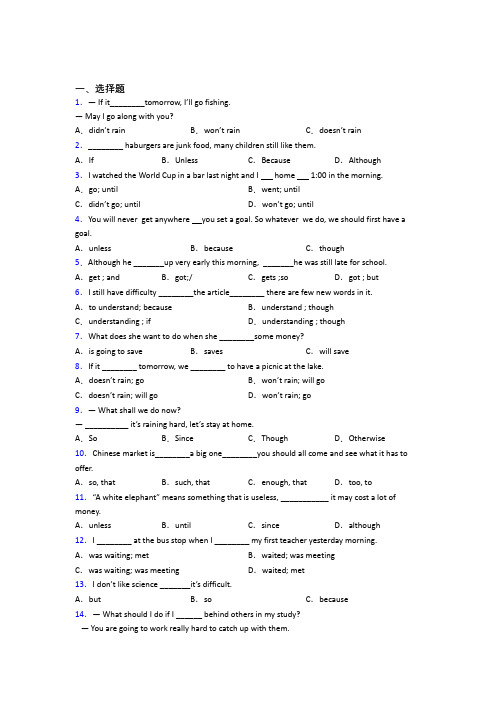
一、选择题1.—If it________tomorrow, I’ll go fishing.— May I go along with you?A.didn’t rain B.won’t rain C.doesn’t rain2.________ haburgers are junk food, many children still like them.A.If B.Unless C.Because D.Although3.I watched the World Cup in a bar last night and I home 1:00 in the morning. A.go; until B.went; untilC.didn’t go; until D.won’t go; until4.You will never get anywhere you set a goal. So whatever we do, we should first have a goal.A.unless B.because C.though5.Although he _______up very early this morning, _______he was still late for school. A.get ; and B.got;/ C.gets ;so D.got ; but6.I still have difficulty ________the article________ there are few new words in it.A.to understand; because B.understand ; though C.understanding ; if D.understanding ; though7.What does she want to do when she ________some money?A.is going to save B.saves C.will save8.If it ________ tomorrow, we ________ to have a picnic at the lake.A.do esn’t rain; go B.won’t rain; will goC.doesn’t rain; will go D.won’t rain; go9.— What shall we do now?—__________ it’s raining hard, let’s stay at home.A.So B.Since C.Though D.Otherwise 10.Chinese market is________a big one________you should all come and see what it has to offer.A.so, that B.such, that C.enough, that D.too, to 11.“A white elephant” means something that is useless, ___________ it may cost a lot of money.A.unless B.until C.since D.although12.I ________ at the bus stop when I ________ my first teacher yesterday morning. A.was waiting; met B.waited; was meetingC.was waiting; was meeting D.waited; met13.I don’t like science _______it’s difficult.A.but B.so C.because14.— What should I do if I ______ behind others in my study?— You are going to work really hard to catch up with them.A.fall B.will fall C.fell15.--We should go to school by bus instead of by car.--Yeah, cars we use, pollution there will be.A.fewer; less B.less; fewerC.the less; the fewer D.the fewer; the less16.Mr. White tells us the calls meeting will be cancelled if no agreement _________ tomorrow. A.is reached B.will be reachedC.is going to be reached D.has been reached17.Sam won’t make any progress ______ he studies harder than befo re.A.if B.when C.because D.unless18.I felt very happy, ___________ I didn't win the singing competition.A.though B.if C.so D.because19.I’ll go to visit my aunt in England the summer holidays start.A.as soon as B.since C.unless20.The bus dri ver always says to us: “Don’t get off ______ the bus stops.”A.when B.whileC.until D.if21.You can’t watch TV ________ you finish your homework.A.after B.if C.when D.until 22.—Why do you sell old books?—I sell them________ raise some money for the poor students.A.in order that B.in order to C.so that D.because of 23.My father was reading ________ I was sleeping.A.while B.when C.before D.after24.It ________ heavily when I left the movie theater.A.rains B.was raining C.is raining D.will rain 25.—Mum, will our trip be cancelled?—No, we won’t put it off________there is a natural disaster.A.if B.whether C.unless D.when【参考答案】***试卷处理标记,请不要删除一、选择题1.C解析:C【解析】【分析】【详解】句意:——如果明天不下雨。
高考语法分类:状语从句小结(有讲解以及最新试题解析)
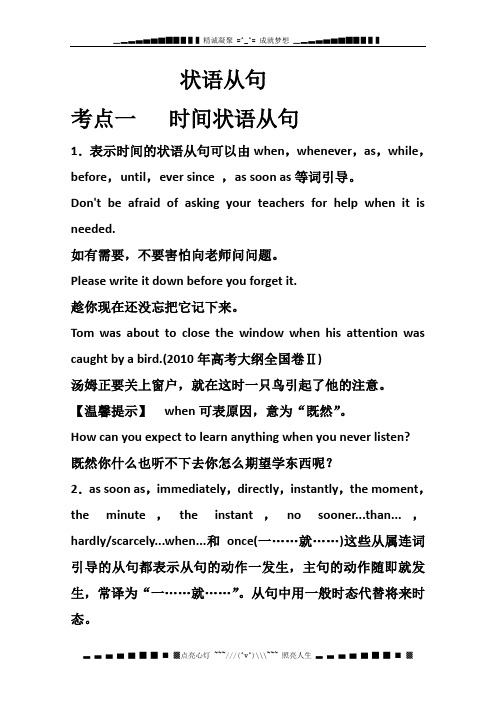
状语从句考点一时间状语从句1.表示时间的状语从句可以由when,whenever,as,while,before,until,ever since ,as soon as等词引导。
Don't be afraid of asking your teachers for help when it is needed.如有需要,不要害怕向老师问问题。
Please write it down before you forget it.趁你现在还没忘把它记下来。
Tom was about to close the window when his attention was caught by a bird.(2010年高考大纲全国卷Ⅱ)汤姆正要关上窗户,就在这时一只鸟引起了他的注意。
【温馨提示】when可表原因,意为“既然”。
How can you expect to learn anything when you never listen?既然你什么也听不下去你怎么期望学东西呢?2.as soon as,immediately,directly,instantly,the moment,the minute,the instant,no sooner...than...,hardly/scarcely...when...和once(一……就……)这些从属连词引导的从句都表示从句的动作一发生,主句的动作随即就发生,常译为“一……就……”。
从句中用一般时态代替将来时态。
The moment I heard the voice, I knew father was coming.我一听到那个声音,我就知道父亲来了。
No sooner had we arrived at the station than the train left.我们刚到车站,火车就离站了。
The boy burst into tears immediately he saw his mother.那男孩一见到他妈妈便放声大哭。
- 1、下载文档前请自行甄别文档内容的完整性,平台不提供额外的编辑、内容补充、找答案等附加服务。
- 2、"仅部分预览"的文档,不可在线预览部分如存在完整性等问题,可反馈申请退款(可完整预览的文档不适用该条件!)。
- 3、如文档侵犯您的权益,请联系客服反馈,我们会尽快为您处理(人工客服工作时间:9:00-18:30)。
一、选择题1.--We should go to school by bus instead of by car.--Yeah, cars we use, pollution there will be.A.fewer; less B.less; fewerC.the less; the fewer D.the fewer; the less2.— Can you tell me when you are going to arrive there?—I’m not sure. But I’ll ring you up as soon as I _____there tomorrow.A.arrive B.arrived C.will arrive D.am going to arrive 3.I couldn’t avoid making _______noise, _______I tried my best.A.so much; although B.so many; althoughC.so much; so that D.so many; so that4.He offered________valuable suggestions ________ few people disagreed.A.such, that B.very, that C.so, that D.too, that5.If it ________ tomorrow, we ________ to have a picnic at the lake.A.doesn’t rain; go B.won’t rain; will goC.doesn’t rain; will go D.won’t rain; go6.I can’t understand that the woman often complains_______she has got a well-paid job and a happy family.A.whenever B.since C.until D.though7.—I’m afraid I can’t finish the job in such a short time.—Don’t worry. Can you do it if you_______ two more hours.?A.give B.are given C.will give D.will be given 8.— Would you please ask Tom to come to my office?—Sure, I will tell you about it as soon as he _______back tomorrow.A.will come B.came C.comes D.is coming9.—________ will the conversation begin?—________ six o’clock.A.How long; Not until B.How long; UntilC.How soon; Not until D.How soon; Until10.—Do you think if I am suitable for this IT job?—You can’t get the job________ you have experience in the computer industry.A.if B.unless C.because D.since11.I don’t like science _______it’s difficult.A.but B.so C.because12.I ________ at the bus stop when I ________ my first teacher yesterday morning.A.was waiting; met B.waited; was meetingC.was waiting; was meeting D.waited; met13.—Mom, I’m leaving for Beijing tomorrow.—That’s nice. You’d better ring me up________you get there.A.as soon as B.until C.while14.___my cousin was practicing the guitar, his elder sister came into the room.A.Since B.While C.Though D.Because 15.Mr. White tells us the calls meeting will be cancelled if no agreement _________ tomorrow. A.is reached B.will be reachedC.is going to be reached D.has been reached16.I felt very happy, ___________ I didn't win the singing competition.A.though B.if C.so D.because17.__________ what he explains to you, just don’t believe him.A.However B.Even though C.But D.No matter 18.Tim is ______ his twin brother. They are both 180 centimeters tall.A.taller than B.shorter than C.as tall as D.not so tall as 19.— When shall we start?—Let’s wait ________ the rain stops.A.if B.as C.until D.since20.You can’t watch TV ________ you finish your homework.A.after B.if C.when D.until 21.—How are you going to spend this weekend?—_________ the weather is fine, we’ll climb Mount Tai.A.As well as B.As good as C.As soon as D.As long as 22.Mr.Green doesn’t have any hobbies________ you call watching TV a hobby.A.though B.unless C.because23.My father was watching TV ______ my mother was cooking.A.when B.untilC.while D.as soon as24.There are fewer and fewer tigers in India. The situation will continue _______ humans stop hunting them for their fur and bones.A.if B.unless C.because D.since 25.—Has Jim known the good news?—Not yet. I will tell him about it ________ he comes back.A.while B.until C.as soon as D.since【参考答案】***试卷处理标记,请不要删除一、选择题1.D解析:D【解析】句意:--我们应该坐公交车去上学而不要坐小汽车。
--是的,我们用的车越少,对环境的污染就越少。
这里句式:the+比较级+主语+谓语,the+比较级+主语+谓语,表示“越……,就越……”。
few修饰可数名词的复数,第一空修饰可数名词cars,所以应该用fewer;第二空pollution是不可数名词,用little的比较级修饰。
故选D。
2.A解析:A【解析】句意:----你能告诉我你什么时候到吗?-----我不确定。
但我明天一到那儿就给你打电话。
A. arrive一般现在时;B. arrived一般过去时;C. will arrive一般将来时;D. am going to arrive一般将来时。
as soon as引导的时间状语从句表将来的事时,这时主句用一般将来时,从句用一般现在,即:主将从现。
本句主句是一般将来时,从句用一般现在时,故选A。
3.A解析:A【解析】【详解】句意:尽管我尽力了,但我还是不能避免发出这么大的声音。
考查so many和so much的区别和从属连词辨析。
so many如此多,后面接可数名词复数;so much如此多,后面接不可数名词;although虽然;so that为了,根据第一个空后面的noise是不可数名词可知,应该用so much修饰,排除B和D,由句意可知,although最符合语境,排除C,故选A。
4.A解析:A【解析】【分析】【详解】句意:他提出了如此有价值的建议,很少有人反对。
考查结构状语从句。
such如此的、这样的,是形容词,修饰名词;so如此、这样,是副词,修饰形容词,副词。
句意:他提出了如此有价值的建议,很少有人反对。
故需从选项A和C中选择。
valuable suggestions中心词是名词suggestions,故第一个空要用such,与之搭配的that就填在第二个空格。
故选A。
5.C解析:C【解析】【分析】【详解】句意:如果明天不下雨,我们就去湖边野餐。
考查主从复合句。
根据If it ___ tomorrow, we ___ to have a picnic at the lake.可知此题考查if引导的条件状状语从句,遵循主将出现的原则,即主句用一般将来时,从句用一般现在时;根据句意:如果明天不下雨,我们就去湖边野餐。
从句用否定形式,rain为实意动词根据it可判断,需要加否定助动词 doesn't,动词用原形 rain,排除B、D选项;主句用一般将来时,即will+动词原形,排除A选项;故答案选C。
6.D解析:D【解析】【详解】句意:我不明白这个女人尽管有一份高薪的工作和一个幸福的家庭她还经常抱怨。
